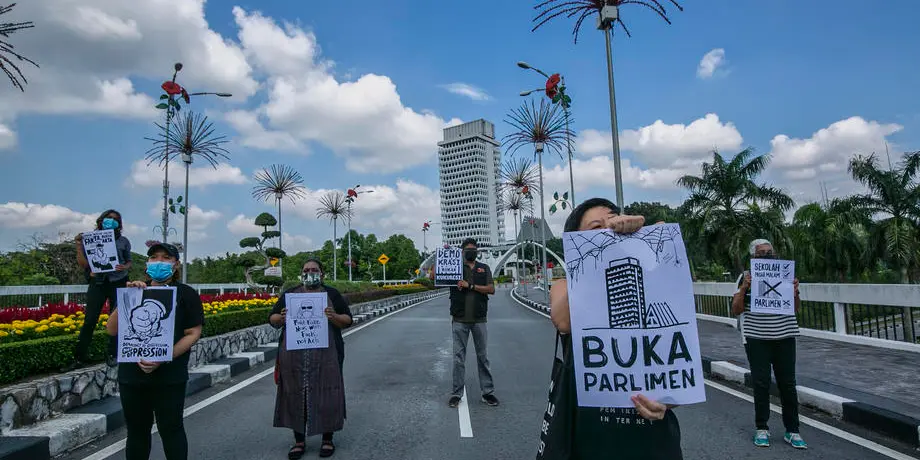
Malaysia: End harassment against opposition lawmakers and critical voices, MPs say
May 25, 2021

JAKARTA – Southeast Asian lawmakers today expressed alarm over the recent surge in harassment against opposition lawmakers and critical voices for exercising their rights to freedom of expression and peaceful assembly in Malaysia, and called on authorities to immediately end such tactics of intimidation. The calls came after at least six MPs and four state-level lawmakers were called in for questioning by authorities on a range of potential charges in recent weeks.
“Peacefully demonstrating and voicing opinions should never be a crime, and the rate at which authorities are targeting those merely discussing issues of public interest is a matter of considerable concern,” said Carlos Zarate, a Philippine Member of Parliament (MP) and member of ASEAN Parliamentarians for Human Rights (APHR). “Basic freedoms have come increasingly under attack since Prime Minister Muhyiddin Yassin’s government came to power last year through back-door maneuvering, and this latest wave of investigations and harassment clearly aims to silence political opponents and all forms of dissent.”
On 22 May, MP Syed Saddiq was questioned by police in relation to a video he posted on social media related to police brutality and to demand justice for A. Ganapathy, who died on 18 April after being held in police custody. According to sources, Saddiq is being investigated under Section 505(b) of the Penal Code for allegedly making statements that cause fear or alarm to the public, and Section 233 of the Communications and Multimedia Act (CMA), for alleged improper use of network facilities. The authorities have seized his phone, and have access to his Instagram and TikTok accounts for further investigation.
On 20 May, MP Mukhriz Mahathir, two state assembly representatives, as well as five other political party members and rights activists, were interrogated for allegedly gathering without notice under Section 9(5) of the Peaceful Assembly Act 2012 (PAA), in relation to a peaceful sit-in protest on 30 April. The rally was held to call for, among other things, the reopening of parliament, which was suspended in January after a state of emergency was declared amid a rise of COVID-19 cases. The emergency has since been used to introduce regulations that further threaten fundamental freedoms, including a ”fake news” ordinance that police have used to investigate at least 12 people accused of spreading false information related to COVID-19.
In early May, eight individuals, including APHR member MP Fahmi Fadzil, as well as seven civil society and political party members, were questioned under Section 9(5) of the PAA over a 24 April solidarity gathering regarding the arrest of political artist Fahmi Reza. Meanwhile, later in the same month, at least 11 people were summoned for questioning under Section 9(5) of the PAA and Regulation 11 of the Prevention and Control of Infectious Diseases (Measures Within Infected Local Areas) (Conditional MCO) (No. 4) Regulations 2021 in relation to a peaceful gathering on 27 March that protested the Election Commission’s delay in implementing the 18-year voting age. Those hauled up included APHR member and MP Maria Chin Abdullah, MP Maszlee Malik, MP Hannah Yeoh, two state assembly representatives, and APHR member and former MP Tian Chua.
In its September 2020 report, Parliamentarians at Risk, APHR found an increase in cases being opened against parliamentarians since the unelected “back-door” Perikatan Nasional government took power in March 2020. At least five opposition MPs in Malaysia were either probed or charged for raising matters of public interest or for being critical of the government.
“In recent weeks, the number of MPs in Malaysia questioned for expressing their opinion already exceeds those APHR documented in the first half of Perikatan Nasional’s rule last year. In addition, parliament has not sat once this year, and the recent judicial harassment is making it even harder for MPs to fulfil their role as a check on the executive, and safeguard against abuse by authorities,” Zarate said.
These investigation tactics however are only part of a broader trend to restrict civic space in Malaysia, including press freedom, APHR said.
Last month, Reporters Without Borders downgraded Malaysia to 119, from 101 a year earlier, in its annual world press freedom index, recording the worst deterioration among 180 countries. The sharp decline is linked to last year’s change in government, and has seen authorities use repressive laws to harass journalists and restrict space for critical reporting. This year, police have opened several investigations to question journalists for their work. The case of A. Ganapathy, in particular, has seen a police chief threaten to sue a media outlet, Free Malaysia Today, for its coverage, and issued a warning to the public not to comment on Ganapathy’s death.
“Authorities must immediately drop all investigations, and cease going after political opponents, human rights defenders, journalists, and other critical voices who are merely exercising their rights to freedom of expression and peaceful assembly. Rather than stifle legitimate criticism, the Malaysian government would find that listening to the voices of its people, including by reopening parliament, could instead bring greater benefit to the country – such as enhancing transparency and accountability – which are key elements of a democratic country, and could help to improve trust in this government,” said Zarate.
ASEAN Parliamentarians for Human Rights (APHR) was founded in June 2013 with the objective of promoting democracy and human rights across Southeast Asia. Our founding members include many of the region's most progressive Members of Parliament (MPs), with a proven track record of human rights advocacy work.